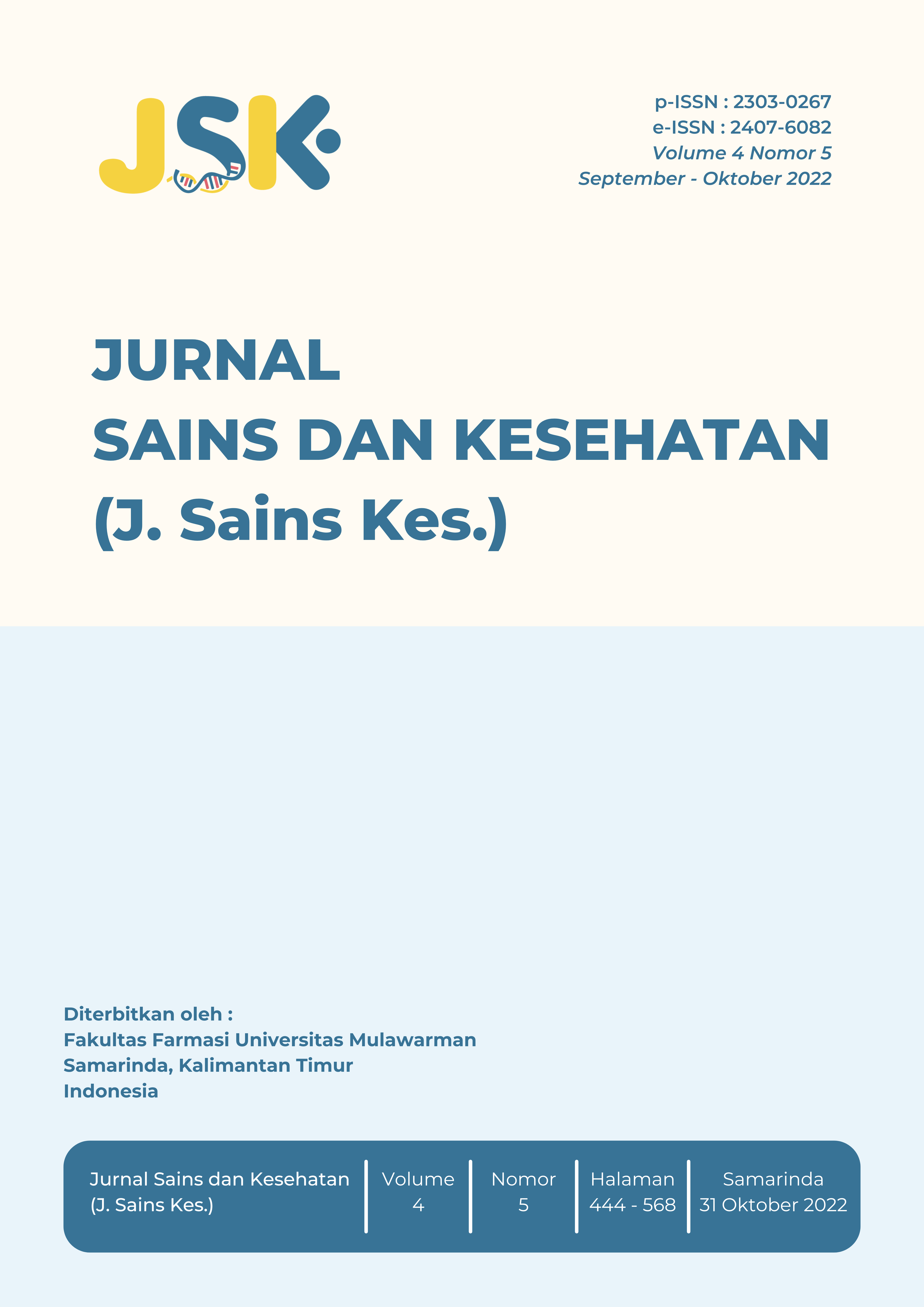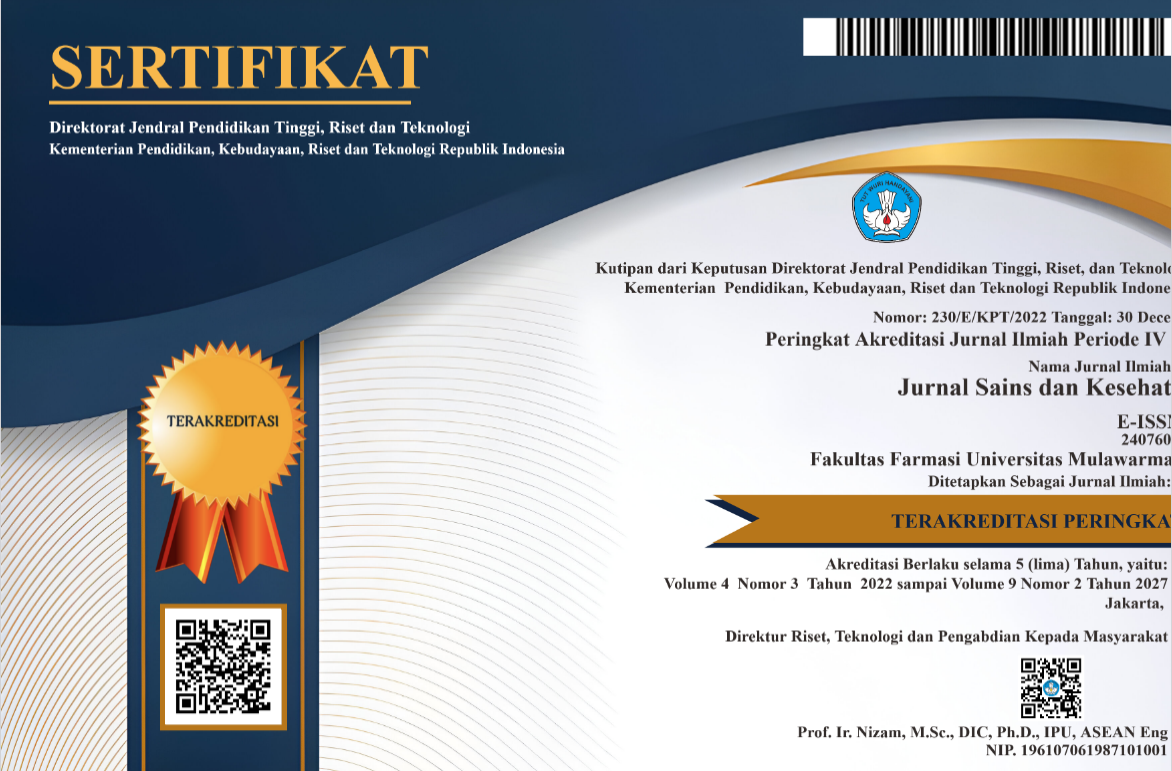Eksplorasi Obesitas Sebagai Faktor Komorbid Covid-19: A Systematic Review
Exploration of Obesity as a Comorbid Factor of Covid-19: A Systematic Review
Keywords:
COVID-19, Analisa biaya, malnutrition, nutritional status, Covid-19 patients, Comorbid DiseaseAbstract
References
Mahan, L.K. 2008.Nutrition and Dietetics. Krause’s Food & Nutrition Therapy, Saunders, Philadelphia.
Dixon, A.E. and Peters, U. 2018.The effect of obesity on lung function. Expert Rev. Respir. Med. 12 (9). 755–767.
Kemenkes, R. 2014.Pedoman Gizi Seimbang. Pedoman Gizi Seimbang; Kementerian Kesehatan RI, Jakarta, 2014.
Torres, L., Martins, V., Faria, A., et al. 2018.The Intriguing Relationship Between Obesity and Infection. J. Infect. 1 (1). 6–10.
Hegde, V. and Dhurandhar, N. V. 2013.Microbes and obesity-interrelationship between infection, adipose tissue and the immune system. Clin. Microbiol. Infect. 19 (4). 314–320.
Bandaru, P., Rajkumar, H. and Nappanveettil, G. 2013.The Impact of Obesity on Immune Response to Infection and Vaccine: An Insight into Plausible Mechanisms. Endocrinol. Metab. Syndr. 02 (02). 1–9.
Marcuso, P. 2013.Obesity and respiratory infections: Does excess adiposity weigh down host defense? Pulm Pharmacol Ther 26 (4). 412–419.
Huttunen, R. and Syrjänen, J. 2013.Obesity and the risk and outcome of infection. Int. J. Obes. 37 (3). 333–340.
McArthur, L., Sakthivel, D., Ataide, R., et al. 2020.Review of burden, clinical definitions, and management of Covid-19 cases. Am. J. Trop. Med. Hyg. 103 (2). 625–638.
Albashir, A.A.D. 2020.The potential impacts of obesity on COVID-19. The potential impacts of obesity on COVID-19. Clin. Med. J. R. Coll. Physicians London 2020., 20, 109–113.
Hamer, M., Kivimäki, M., Gale, C.R., et al. 2020.Lifestyle risk factors, inflammatory mechanisms, and COVID-19 hospitalization: A community-based cohort study of 387,109 adults in UK. Brain. Behav. Immun. 87 (May). 184–187.
Petersen, A., Bressem, K., Albrecht, J., et al. 2020.The role of visceral adiposity in the severity of COVID-19: Highlights from a unicenter cross-sectional pilot study in Germany. Metabolism 110 (154317). 1–11.
Bhasin, A., Nam, H., Yeh, C., et al. 2020.Is BMI Higher in Younger Patients with COVID-19? Association Between BMI and COVID-19 Hospitalization by Age. Obesity 28 (10). 1811–1814.
Gao, F., Zheng, K.I., Wang, X.B., et al. 2020.Obesity Is a Risk Factor for Greater COVID-19 Severity. Diabetes Care 43 (7). E72–E74.
Hernández-Garduño, E. 2020.Obesity is the comorbidity more strongly associated for Covid-19 in Mexico. A case-control study. Obes. Res. Clin. Pract. 14 (4). 375–379.
Moriconi, D., Masi, S., Rebelos, E., et al. 2020.Obesity prolongs the hospital stay in patients affected by COVID-19, and may impact on SARS-COV-2 shedding. Obes. Res. Clin. Pract. 14 (3). 205–209.
de Lusignan, S., Dorward, J., Correa, A., et al. 2020.Risk factors for SARS-CoV-2 among patients in the Oxford Royal College of General Practitioners Research and Surveillance Centre primary care network: a cross-sectional study. Lancet Infect. Dis. 20 (9). 1034–1042.
Ebinge, J.E., Achamallah, N., Ji, H., et al. 2020.Pre-existing traits associated with Covid-19 illness severity. PLoS One 15 (7 July). 1–16.
Kammar-García, A., de Vidal-Mayo, J.J., Vera-Zertuche, J.M., et al. 2020.Impact of comorbidities in Mexican SARS-CoV-2-positive patients: A retrospective analysis in a national cohort. Rev. Investig. Clin. 72 (3). 151–158.
Price-Haywood, E.G., Burton, J., Fort, D., et al. 2020.Hospitalization and Mortality among Black Patients and White Patients with Covid-19. N. Engl. J. Med. 382 (26). 2534–2543.
Hernández-Galdamez, D.R., González-Block, M.Á., Romo-Dueñas, D.K., et al. 2020.Increased Risk of Hospitalization and Death in Patients with COVID-19 and Pre-existing Noncommunicable Diseases and Modifiable Risk Factors in Mexico. Arch. Med. Res. 51 (7). 683–689.
Kalligeros, M., Shehadeh, F., Mylona, E.K., et al. 2020.Association of Obesity with Disease Severity Among Patients with Coronavirus Disease 2019. Obesity 28 (7). 1200–1204.
Ortiz-Brizuela, E., Villanueva-Reza, M., González-Lara, M.F., et al. 2020.Clinical and Epidemiological Characteristics of Patients Diagnosed With Covid-19 in a Tertiary Care Center in Mexico City: a Prospective Cohort Study. Rev. Invest. Clin. 72 (3). 165–177.
Simonnet, A., Chetboun, M., Poissy, J., et al. 2020.High Prevalence of Obesity in Severe Acute Respiratory Syndrome Coronavirus-2 (SARS-CoV-2) Requiring Invasive Mechanical Ventilation. Obesity 28 (7). 1195–1199.
Klang, E., Kassim, G., Soffer, S., et al. 2020.Severe Obesity as an Independent Risk Factor for COVID?19 Mortality in Hospitalized Patients Younger than 50. Obesity 28 (9). 1595–1599.
Busetto, L., Bettini, S., Fabris, R., et al. 2020.Obesity and COVID-19: An Italian Snapshot. Obesity 28 (9). 1600–1605.
Escalera-Antezana, J.P., Lizon-Ferrufino, N.F., Maldonado-Alanoca, A., et al. 2020.Risk factors for mortality in patients with coronavirus disease 2019 (COVID-19) in Bolivia: An analysis of the first 107 confirmed cases. Infez. Med. 28 (2). 238–242.
Hu, X., Pan, X., Zhou, W., et al. 2020.Clinical epidemiological analyses of overweight/obesity and abnormal liver function contributing to prolonged hospitalization in patients infected with COVID-19. Int. J. Obes. 44 (8). 1784–1789.
Petrilli, C.M., Jones, S.A., Yang, J., et al. 2020.Factors associated with hospital admission and critical illness among 5279 people with coronavirus disease 2019 in New York City: prospective cohort study. BMJ 369 (m1966). m1966.
Sattar, N., Ho, F.K., Gill, J.M., et al. 2020.BMI and future risk for COVID-19 infection and death across sex, age and ethnicity: Preliminary findings from UK biobank. Diabetes Metab. Syndr. Clin. Res. Rev. 14 (5). 1149–1151.
Deng, M., Qi, Y., Deng, L., et al. 2020.Obesity as a Potential Predictor of Disease Severity in Young COVID-19 Patients: A Retrospective Study. Obesity 28 (10). 1815–1825.
Palaiodimos, L., Kokkinidis, D.G., Li, W., et al. 2020.Severe obesity, increasing age and male sex are independently associated with worse in-hospital outcomes, and higher in-hospital mortality, in a cohort of patients with COVID-19 in the Bronx, New York. Metabolism 108 (January). 154262.
Giacomelli, A., Lisa, A., Milazzo, L., et al. 2020.30-day mortality in patients hospitalized with COVID-19 during the first wave of the Italian epidemic: A prospective cohort study. Pharmacol. Res. 158 (104931). 1–7.
Muhammad, H.F.L. 2021.Imunologi Gizi. Imunologi Gizi; UGM Press, Yogyakarta, 2021.
Caspar-Bauguil, S., Cousin, B., Galinier, A., et al. 2005.Adipose tissues as an ancestral immune organ: Site-specific change in obesity. FEBS Lett. 579 (17). 3487–3492.
Weisberg, S.P., McCann, D., Desai, M., et al. 2003.Obesity is associated with macrophage accumulation in adipose tissue. J. Clin. Invest. 112 (12). 1796–1808.
Sharma, J.R. and Yadav, U.C.S. 2021.COVID-19 severity in obese patients: Potential mechanisms and molecular targets for clinical intervention. Obes. Res. Clin. Pract. 15 (2). 163–171.
Roschewski, M., Lionakis, M.S., Sharman, J.P., et al. 2020.Inhibition of Bruton tyrosine kinase in patients with severe COVID-19. Sci. Immunol. 5 (48). 1–18.
Mangalmurti, N. and Hunter, C.A. 2020.Cytokine Storms: Understanding COVID-19. Immunity 53 (1). 19–25.
Downloads
Published
Issue
Section
Deprecated: json_decode(): Passing null to parameter #1 ($json) of type string is deprecated in /home/jskff/public_html/plugins/generic/citations/CitationsPlugin.php on line 68
How to Cite
Similar Articles
- Josephine Retno Widayanti, Jimmy Fransisco Abadinta Barus, Tena Djuartina, Irene Vanessa, Mikel Ann Yineri Enumbi, Siti Setiati, Widiastuti M.I. , Status Nutrisi, Komorbiditas dan Fungsi Kognitif pada Lansia Perempuan di Panti Wreda , Jurnal Sains dan Kesehatan: Vol. 6 No. 2 (2025): J. Sains Kes.
- Dwi Fitrah Wahyuni, An Nisaa Nurzak, Arifuddin Yunus, Nabilah Baharuddin, Sitti Nur Intang, Pola Pengobatan Covid-19 pada Pasien Komorbid di RSUD dr. La Palaloi , Jurnal Sains dan Kesehatan: Vol. 4 No. 5 (2022): J. Sains Kes.
- Alius Cahyadi, Maria Riastuti Iryaningrum, Christina Jeanny, Status Nutrisi pada Pasien Penyakit Ginjal Kronik yang Menjalani Hemodialisis dan Non-dialisis di RS Atma Jaya Tahun 2021-2024 , Jurnal Sains dan Kesehatan: Vol. 6 No. 3 (2025): J. Sains Kes.
- Aulia Seftiya, Khemasili Kosala, Epidemiologi Karakteristik Pasien Covid-19 di Kalimantan Utara , Jurnal Sains dan Kesehatan: Vol. 3 No. 5 (2021): J. Sains Kes.
- Semuel Piter Irab, Rosmin M. Tingginehe, Yacob Ruru, Keterbatasan Pangan Balita Perkotaan dan Pedesaan Provinsi Papua Indonesia pada Masa Pandemi COVID-19 , Jurnal Sains dan Kesehatan: Vol. 4 No. 1 (2022): J. Sains Kes.
- Putri Dina Mahera Laily , Laporan Kasus: Terapi Covid-19 pada Pasien dengan Komorbid Hipertensi , Jurnal Sains dan Kesehatan: Vol. 4 No. 2 (2022): J. Sains Kes.
- Ira Purbosari, Fajar Jamaluddin Sandhori, Audin Nur Affifah Febriyanti, Studi Penggunaan Glukokortikoid Pada Pasien Penyakit Paru Obstruktif Kronik Di RSUD R.T. Notopuro Sidoarjo , Jurnal Sains dan Kesehatan: Vol. 6 No. 3 (2025): J. Sains Kes.
- Jamil Anshory, Aulia Dwi Nur Anggraini, Satriani Satriani, Protein Intake, Nutritional Status, and Family Socioeconomic Relationships with Learning Achievement of Children Aged 13-15 Years at Nabil Husein Junior High School Samarinda Year 2022 , Jurnal Sains dan Kesehatan: Vol. 5 No. 1 (2023): J. Sains Kes.
- Taureni Hayati, Mirna Albertina Wijaja, Sri Murtiyani Kusumastuti, Profil Hematologi Pasien Covid-19 Berdasarkan Beratnya Kasus , Jurnal Sains dan Kesehatan: Vol. 4 No. 3 (2022): J. Sains Kes.
- Aris Aris, Yusi Anggriani, Hanafy Dudy Arman, Yacob Ruru, Analisis Biaya Operasi Teknik Off-pump CABG dibandingkan On-pump CABG Pasien BPJS Penyakit Jantung Koroner dengan Fungsi Jantung Buruk di Rumah Sakit Jantung Harapan Kita , Jurnal Sains dan Kesehatan: Vol. 3 No. 2 (2021): J. Sains Kes.
You may also start an advanced similarity search for this article.




